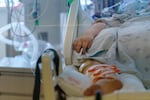Oregon’s hospitals are close to running out of beds — and a backlog of patients waiting to move into the state’s understaffed long-term care facilities is making the problem worse.
Statewide, 582 people who are currently occupying hospital beds are ready to be discharged, but they can’t find a bed somewhere else.
“They may need a nursing home, a rehab bed, behavioral health support, or they may not even have a home to go to,” said Becky Hultberg, President of the Oregon Association of Hospitals and Health Systems.

Oregon’s hospitals are close to running out of beds like this one in the intensive care unit last August at Oregon Health and Science University in Portland.
Kristyna Wentz-Graff / OPB
That’s roughly 10 percent of all adult hospital beds statewide being occupied by people ready for discharge. For comparison, about 20 percent of the state’s beds are currently occupied by patients with COVID-19.
The discharge delays are a longstanding issue the pandemic has made worse.
Patients may struggle to find a facility that accepts their insurance, or that works with people with behavioral health conditions. Or some are simply homeless, according to Hultberg.
On top of that, places that would typically receive many of those patients - nursing homes and other long-term care facilities — are desperately short staffed.
Oregon’s 690 long-term care facilities have 400 unfilled positions for nurses and over 1,200 unfilled positions for certified nursing assistants, according to the state’s long-term care ombudsman.
Hultberg said in the short term, the state has set up “decompression units,” nursing homes contracted to take patients ready for hospital discharge.
“They are a part of the solution — they are not the whole solution,” she said.
In the meantime, to manage the shortage of available beds, many hospitals are cancelling elective surgeries on a day to day basis, trying to fit in the ones that are most critical, and delaying those that can be safely delayed.
This crunch comes as the burden on hospitals from the COVID-19 pandemic is still expected to worsen. With more than 1,000 people with confirmed or suspected COVID-19 in hospitals, the state could exceed the peak it hit during the delta surge in the next few days.
State data currently shows about 94% of adult in-patient beds in hospitals are occupied. Federal data, which includes pediatric beds as well, shows 80 percent of total beds in Oregon are currently occupied.
One small bit of good news: the patients with COVID-19 who are in many of those limited hospital beds, are generally not as sick as the people battling the illness during the last wave.
